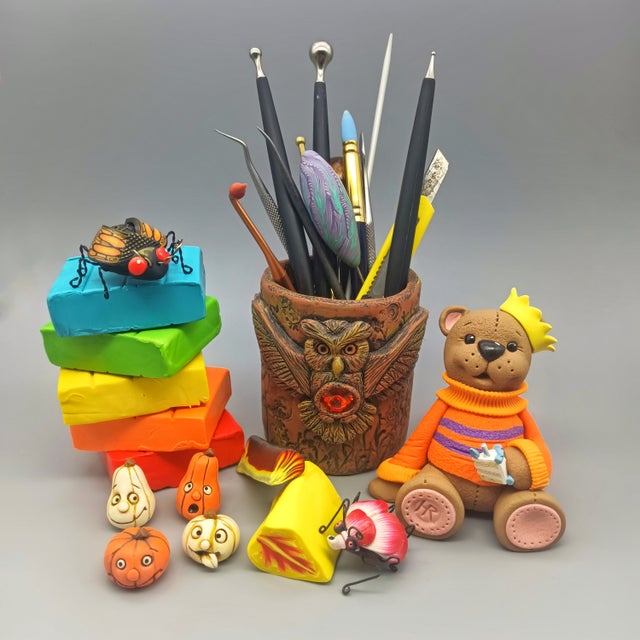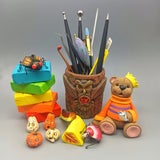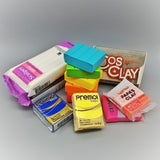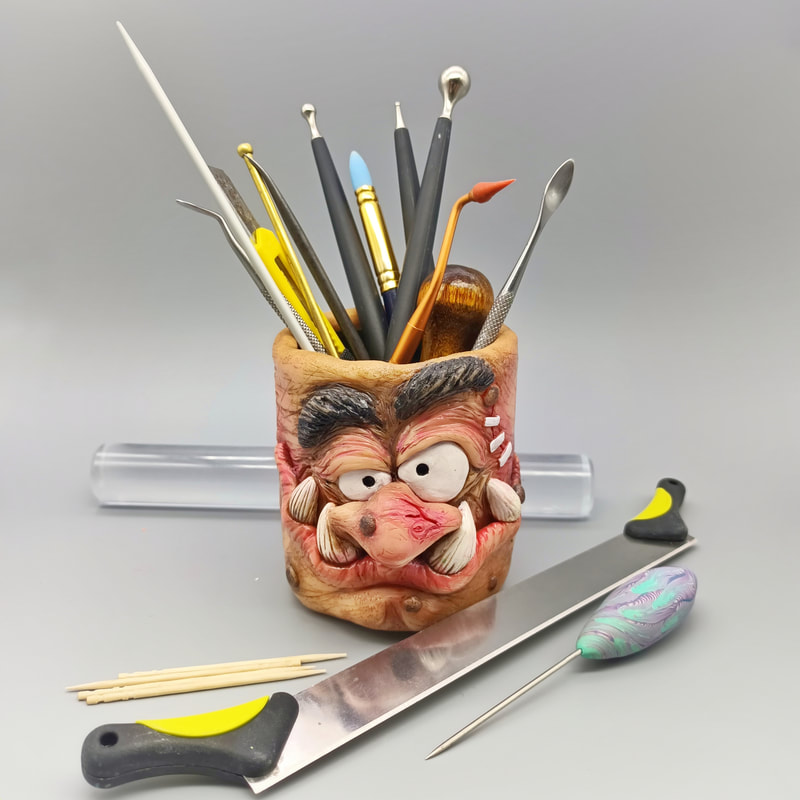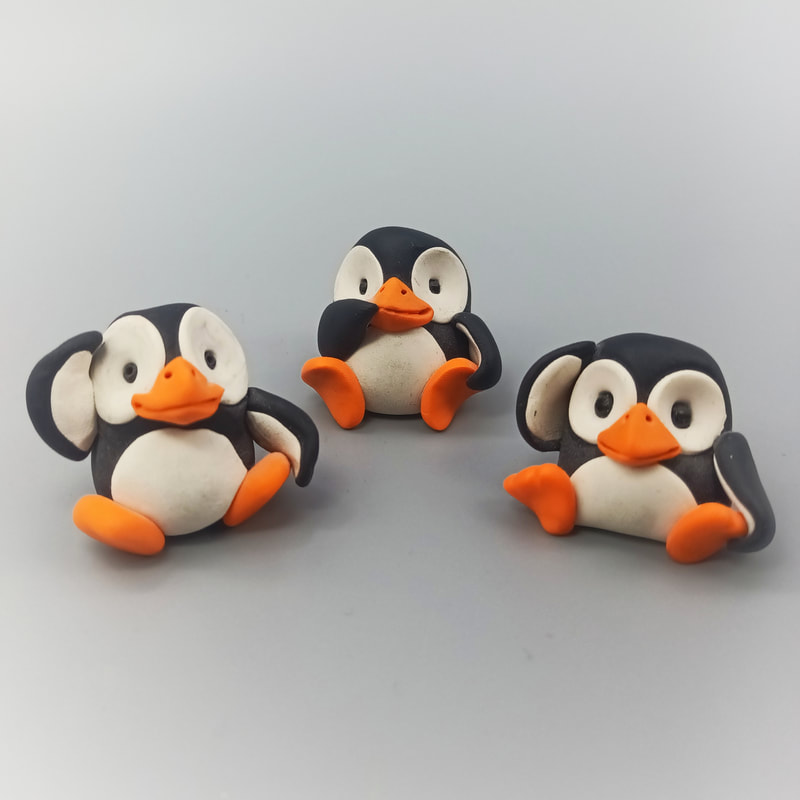ONLINE An Introduction to Polymer Clay - Mon 11th September 2023 at 2pm
SKU:
HR1109aa12
£45.00
£45.00
Unavailable
per item
CLASS CANCELLED DUE TO LOW ENROLMENT
Due to the interactive nature of this workshop, we would encourage students to participate live and work along with the tutor, if possible.
A video playback service will still be provided to all students for 60 days.
Only 1 left!
Tutor: Heather Robertson
Mon 11th September 2pm - 4:30pm
(UK timings)
This LivePlus™ online workshop is suitable for anyone who wants to learn more abut using polymer clay. It is a work-along workshop and so we would encourage students to have their materials to hand, ready to participate live during the class.
Workshop details
If you thought polymer clay was just for children, think again! In this brand-new workshop we will learn the basics of working with this exciting and versatile synthetic sculpting medium.
Polymer clay comes in many colours and remains pliable until heat is applied. It can be baked in a home oven which means it has become a firm favourite for many artists and hobbyists, from sculptors and concept artists to jewellery designers and miniature artists.
Start your polymer clay journey here and discover just how much can be done with this small block of colourful clay. In this class, Heather will show you all the basics to get you started, as well as the skills to make some simple characters, using simple shapes, tools, and textures.
Heather has been using polymer clay for over 15 years and is still enjoying the thrill of discovering something new every day. You can see examples of her work at the bottom of this page.
Specific skills you will learn at the workshop
Equipment & materials list
Materials are not included in the course fee. All the materials and equipment you will need are listed below.
Polymer clay
Heather prefers to use Sculpey Premo! (which comes in many colours) and Super Sculpey (this only comes in beige and grey), but Fimo soft and Cernit will also work. Some of the other brands and ranges may be too soft (Sculpey III and Bakeshop), or too hard (Fimo professional and Kato).
You will only need a few colours to get started, but black and white are always a good base to start. All techniques in this course can be applied using black and white clay.
Multipacks containing half size blocks of clay are also available.
Basic tools and work surface
Optional tools that you may wish to use are:
Links to suppliers
Additional Information
All Ardington ONLINE classes and talks are accompanied by their own online blackboard. Helpful and easy to use, they enable students and tutors to share resources, ideas and photos with each other – just as you would in a classroom environment.
Heather will offer personalised critique / feedback via the blackboard for any work uploaded by students within thirty days of the class ending. You will be sent the link to access your blackboard in the week before your class begins and will have access for at least sixty days after the class ends.
After the live session has finished on Zoom, we will share the link to view the recording on the blackboard. You can watch the recording as many times as you like for sixty days.
We suggest that you do not buy any specialist materials more than one week in advance as, occasionally, a class may be cancelled due to low enrolment.
Mon 11th September 2pm - 4:30pm
(UK timings)
This LivePlus™ online workshop is suitable for anyone who wants to learn more abut using polymer clay. It is a work-along workshop and so we would encourage students to have their materials to hand, ready to participate live during the class.
Workshop details
If you thought polymer clay was just for children, think again! In this brand-new workshop we will learn the basics of working with this exciting and versatile synthetic sculpting medium.
Polymer clay comes in many colours and remains pliable until heat is applied. It can be baked in a home oven which means it has become a firm favourite for many artists and hobbyists, from sculptors and concept artists to jewellery designers and miniature artists.
Start your polymer clay journey here and discover just how much can be done with this small block of colourful clay. In this class, Heather will show you all the basics to get you started, as well as the skills to make some simple characters, using simple shapes, tools, and textures.
Heather has been using polymer clay for over 15 years and is still enjoying the thrill of discovering something new every day. You can see examples of her work at the bottom of this page.
Specific skills you will learn at the workshop
- Polymer clay - what is it? (liquid and block clay)
- Polymer clay brands and their different properties and uses
- Conditioning clay - what does that mean and why is it important
- Tools - the few basic tools needed to get started, as well as some essential and non-essential specialist tools
- Work surfaces and space
- Mixed media and adding colour - what other art materials can be used with polymer clay
- Canes – a basic introduction
- Surface techniques – a basic introduction
- Mark making and using texture - a basic introduction
- Armatures - a basic introduction
- Correct baking and why it is so important
- Varnishing and sealing – when is it necessary/ not necessary, and what to avoid
- Storage – how to correctly store polymer clay
- How to create simple characters using basic shapes and texture
Equipment & materials list
Materials are not included in the course fee. All the materials and equipment you will need are listed below.
Polymer clay
Heather prefers to use Sculpey Premo! (which comes in many colours) and Super Sculpey (this only comes in beige and grey), but Fimo soft and Cernit will also work. Some of the other brands and ranges may be too soft (Sculpey III and Bakeshop), or too hard (Fimo professional and Kato).
You will only need a few colours to get started, but black and white are always a good base to start. All techniques in this course can be applied using black and white clay.
Multipacks containing half size blocks of clay are also available.
Basic tools and work surface
- Your hands – this is the best sculpting tool in your kit!
- A glass chopping board, or smooth ceramic tile to work on
- a craft knife (to cut clay)
- toothpicks, sewing needles/pins
- An acrylic or metal clay roller (small glass bottle will also work)
- Baby wipes or hand sanitiser/isopropyl alcohol and paper towel for clean-up
- Oven thermometer - essential for correct baking although not essential when trying out the clay
Optional tools that you may wish to use are:
- Small knitting needle or awl (optional, but these are two of Heather’s favourite tools)
- Basic metal sculpting tool set
- Ball tools / nail art dotting tools / embossing tool
- Pasta machine if you have one
- Paint brushes and acrylic paint
- Soft chalk pastels / pan pastels
- Anything that you think would make for a great sculpting tool. Have a look in your crafting stash, you’ll be amazed at how many tools from other crafts can be used with polymer clay.
Links to suppliers
- Sculpey.com (Direct sales in the US, and a list of international distributors)
- Clayaround - Penny at Clayround stocks a great supply of polymer clay products in the UK
- Craft cellar (a UK supplier)
- Tiranti (UK supplier of sculpting tools and products)
- Amazon stock the clay singles and multipacks
- The Blue Bottle Tree for a list of reliable suppliers around the world.
Additional Information
All Ardington ONLINE classes and talks are accompanied by their own online blackboard. Helpful and easy to use, they enable students and tutors to share resources, ideas and photos with each other – just as you would in a classroom environment.
Heather will offer personalised critique / feedback via the blackboard for any work uploaded by students within thirty days of the class ending. You will be sent the link to access your blackboard in the week before your class begins and will have access for at least sixty days after the class ends.
After the live session has finished on Zoom, we will share the link to view the recording on the blackboard. You can watch the recording as many times as you like for sixty days.
We suggest that you do not buy any specialist materials more than one week in advance as, occasionally, a class may be cancelled due to low enrolment.
